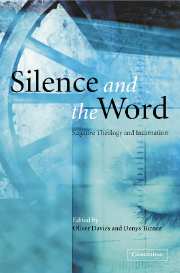Book contents
- Frontmatter
- Contents
- Notes on contributors
- Preface
- Introduction
- 1 Apophaticism, idolatry and the claims of reason
- 2 The quest for a place which is ‘not-a-place’: the hiddenness of God and the presence of God
- 3 The gift of the Name: Moses and the burning bush
- 4 Aquinas on the Trinity
- 5 Vere tu es Deus absconditus: the hidden God in Luther and some mystics
- 6 The deflections of desire: negative theology in trinitarian disclosure
- 7 The formation of mind: Trinity and understanding in Newman
- 8 ‘In the daylight forever?’: language and silence
- 9 Apophasis and the Shoah: where was Jesus Christ at Auschwitz?
- 10 Soundings: towards a theological poetics of silence
- Select bibliography
- Index
2 - The quest for a place which is ‘not-a-place’: the hiddenness of God and the presence of God
Published online by Cambridge University Press: 22 September 2009
- Frontmatter
- Contents
- Notes on contributors
- Preface
- Introduction
- 1 Apophaticism, idolatry and the claims of reason
- 2 The quest for a place which is ‘not-a-place’: the hiddenness of God and the presence of God
- 3 The gift of the Name: Moses and the burning bush
- 4 Aquinas on the Trinity
- 5 Vere tu es Deus absconditus: the hidden God in Luther and some mystics
- 6 The deflections of desire: negative theology in trinitarian disclosure
- 7 The formation of mind: Trinity and understanding in Newman
- 8 ‘In the daylight forever?’: language and silence
- 9 Apophasis and the Shoah: where was Jesus Christ at Auschwitz?
- 10 Soundings: towards a theological poetics of silence
- Select bibliography
- Index
Summary
THE HIDDENNESS OF WISDOM
‘But where shall wisdom be found?
And where is the place of understanding?’
This question, placed in the mouth of the unfortunate Job (Job 28:12), appears to be an enquiry about a particular place where wisdom might be located. Likewise the answer, ‘Mortals do not know the way to it (v. 13)’, appears on first sight to be a denial of entrance to this mysterious place, and since it is divine wisdom which is in view the questioner is also apparently faced by the remoteness of God. Human beings are, it seems, confronted by an absolute transcendence excluding them from the dwelling-place of God's wisdom, which is nothing less than a dimension of the divine personality. Only ‘God understands the way to it’ (v. 23). However, we shall see that the question ‘where shall wisdom be found?’ is in fact a riddle, and the answer is both surprising and playful as all riddles are. It is not a mere piece of rhetoric, expecting the answer ‘nowhere by human beings’ or ‘in heaven with God’. Wisdom is certainly hidden, but the solution to the riddle is more positive, though cautionary, pointing us towards a ‘place’ which is not literally a place at all.
In this essay I want to show that this quest for a ‘not-a-place’ offers an important clue to the nature of the presence of a God who is hidden, but not absent and inaccessible.
- Type
- Chapter
- Information
- Silence and the WordNegative Theology and Incarnation, pp. 35 - 60Publisher: Cambridge University PressPrint publication year: 2002
- 2
- Cited by

